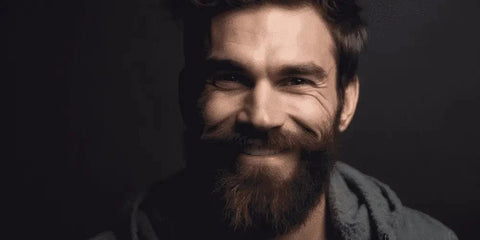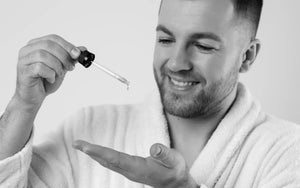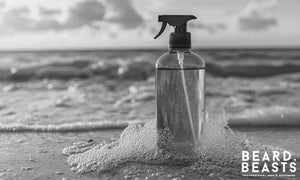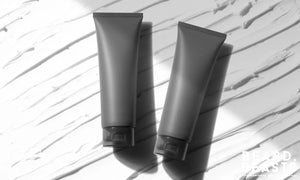Do Beards Make You Look Older
Have you ever wondered, Do beards make you look older? It's a question that pops up in conversations around grooming tables, in men's fashion forums, and maybe even in your mind as you stand in front of the mirror, contemplating a shave.
Beards have always been more than just facial hair. They're a statement, a fashion choice, and for many, a symbol of maturity. But do they really add years to your appearance, or is that just a well-groomed myth? This isn't just a question of vanity; it taps into deeper aspects of how we perceive age, maturity, and style in our society.
Understanding the impact of beards on perceived age isn't just essential for those thinking of growing (or shaving off) their facial hair. It's also crucial for anyone curious about the subtle ways our appearance shapes how others see us. Whether you're aiming to look more seasoned for a job interview, contemplating a change in style, or just curious about this hairy phenomenon, this article is your one-stop guide.
So, let's dive into this fuzzy topic and unravel the truth about beards and age. Are you ready to see if a beard can turn back the clock or fast forward it? Let's find out together!
The Perception of Age and Appearance: A Beard's Influence
How do people associate facial hair with age? Is the mere act of growing a beard seen as a milestone on the path to maturity or a symbol of wisdom acquired with years? Let's delve into this topic and seek to understand the relationship between beards and age perception.
How Do People Associate Facial Hair with Age?
It's no secret that appearances play a significant role in how we perceive people around us. An individual's age is often one of the first things we subconsciously guess based on their outward appearance. But, where do beards fit into this instinctive process of age estimation?
In many cultures around the world, facial hair is associated with adulthood and maturity. A clean-shaven boy sprouting his first stubble is often seen as a rite of passage, a step into manhood. As such, beards can sometimes be seen as a sign of age, not because they make a person look physically older, but because they're associated with adult maturity.
Moreover, a full, thick beard can be perceived as an indicator of health and virility, traits often linked with the prime of a man's life. Conversely, a patchy beard or thinner facial hair can sometimes be associated with either youth or advancing age. Thus, the nature and growth of the beard itself can influence perceived age.
Societal Perceptions: Do Beards Make You Look Older?
Societal perceptions often play a major role in shaping our opinions, and the case of beards making one look older is no exception. In media and popular culture, beards are often depicted as a symbol of wisdom and experience, characteristics typically associated with older age. Consider the archetypal image of the sage old man with a long, flowing beard, or the rugged, experienced cowboy with a well-groomed beard.
However, in today's ever-changing fashion landscape, beards are increasingly becoming a trendy style statement for men of all ages. This has led to a shift in perception, with many arguing that a well-maintained beard does not necessarily make a man look older but rather more stylish and distinguished.
Furthermore, societal views on beards can differ vastly based on cultural contexts. In some societies, beards are predominantly seen as a sign of aging, while in others, they are perceived as a mark of prestige and power, irrespective of age.
In conclusion, whether facial hair makes one look older is largely subjective and depends on societal perceptions, cultural norms, and personal interpretations. However, this is just the surface of our exploration. As we delve further, we'll take into account scientific research and personal experiences to present a comprehensive view of the impact of facial hair on age perception. So, let's continue this intriguing journey.
The Science Behind Facial Hair and Age Perception
While societal perceptions and personal interpretations contribute significantly to how we associate beards with age, it's crucial to examine this intriguing topic from a scientific lens. Do beards make you look older in the eyes of science, or is the perceived correlation merely a societal construct? Let's take a closer look.
The Science Behind It: Do Beards Make You Look Older?
Interestingly, scientific studies have explored the relationship between facial hair and perceived age, though their findings may surprise you.
According to a study published in the journal Evolution and Human Behavior, men with full beards were perceived as older and as having a higher social status than their clean-shaven counterparts. However, the same study found that men with heavy stubble were considered most attractive, suggesting that perceived age and attractiveness might not necessarily be linked.
Another study from the Journal of Behavioral Ecology found that both men and women perceived men with beards to be older and of higher social status. This perception was amplified if the man had a fuller beard.
Moreover, the presence of grey hair in a beard can further influence perceived age. A greying beard is often associated with wisdom and experience, yes, but it can also undoubtedly make a man appear older.
Interpreting Research: How Does Facial Hair Influence Perceived Age?
While the aforementioned studies suggest a correlation between facial hair and perceived age, it's crucial to interpret these findings with a degree of caution.
Firstly, these studies typically rely on subjective perceptions and are influenced by the cultural and societal norms of the participants. So, while they do provide some insight into general trends, individual opinions can vary widely.
Secondly, these studies highlight the role of beard thickness and greyness in age perception. A patchy beard may give an impression of youthfulness or late adolescence, while a full, thick, or greying beard might lead to perceptions of an older age.
Lastly, the studies indicate that there might be a difference between making one look 'older' and 'more attractive.' It's an interesting angle to consider – while a full beard may make one appear older, it doesn't necessarily make them less attractive.
So, do beards make you look older? From a scientific perspective, the answer appears to lean towards a 'yes,' but with the understanding that it can be influenced by factors like beard thickness and colour.
However, the relationship between beards, age, and attractiveness is more complex, hinting that looking 'older' may not be a detriment but could potentially enhance one's appeal.
As we progress further into this exploration, we'll examine how different beard styles and beard maintenance practices can influence age perception. Stay with us as we continue this captivating deep-dive into the world of beards and age.
Influence of Beard Styles on Age Perception: The Power of Grooming
We've explored societal perceptions and scientific viewpoints, but there's another significant aspect to consider when discussing whether beards make you look older - the style of the beard itself. After all, not all beards are created equal. The same face can give off vastly different vibes depending on the style, shape, and maintenance of the beard. So, let's delve into the world of beard styles and their impact on age perception.
Different Beards, Different Ages: Which Beard Styles Make You Look Older?
From the rugged full beard to the sleek goatee, from the sophisticated stubble to the timeless mutton chops, each beard style carries a unique personality, which can significantly influence how old you appear.
Full beards, especially when thick and bushy, can often make a person look older. This perception might be due to their association with maturity, masculinity, and life experience. On the other hand, lighter stubble or neatly trimmed beard styles often exude a youthful vibe, especially when they're well-maintained and complement the shape of the face.
Unkempt, disheveled beards can give an impression of age, not necessarily due to the passage of time, but possibly because they're often associated with neglect and lack of self-care, characteristics sometimes linked with advanced age. Meanwhile, goatees and moustaches, due to their versatility, can swing either way depending on how they're worn and maintained.
Do Beards Make You Look Older, or Is It About the Style?
The question now evolves - is it just the presence of a beard that affects age perception, or does the style play an equally vital, if not more significant, role?
While our exploration so far indicates that beards can make you look older, the style of the beard seems to have a pronounced impact on this perception. A well-chosen beard style that suits your face shape, personality, and lifestyle can make you look mature without necessarily making you appear 'old'. Instead, it can lend an air of sophistication, allure, and charm that goes beyond mere age.
The way you maintain and groom your beard is also critical. Regular trimming, washing, and the use of quality beard-care products can keep your beard looking fresh and youthful. After all, a well-groomed beard reflects self-care and attention to detail, traits that are attractive at any age.
In conclusion, while facial hair can contribute to a more mature appearance, the style of the beard, the way it's maintained, and how well it suits the individual plays a significant role in determining whether it makes you look older or simply more distinguished.
As we continue on this fascinating journey of do beards make you look older, we'll look at how beard growth and maintenance practices further influence age perception. Stay with us as we delve deeper into this intriguing exploration.
Beard Growth and Age: Understanding the Connection
So far, we've been considering the impact of a fully grown beard on age perception. But what about the process of growing a beard itself? Does the age at which one can grow facial hair influence how old they seem? Let's further explore this connection between beard growth, age, and perceived age.
The Relationship Between Beard Growth and Age
Beard growth is a biological process primarily driven by hormonal changes, specifically the increased production of testosterone during puberty. This means that the ability to grow a beard is often associated with reaching a certain stage in life, typically adolescence or young adulthood.
In the initial stages, facial hair often grows in unevenly, resulting in what many refer to as a 'patchy' beard. This is a common feature among young adults and is often perceived as a sign of youth or late adolescence.
As men grow older, their beards typically become denser and fuller due to the continuation of hormonal changes and the lifecycle of the hair follicles. Therefore, a full beard is often associated with being older, although this is more about biological maturity than numerical age.
Does the Age of Facial Hair Growth Impact Perceived Age?
While the onset of facial hair growth is a clear sign of maturing from boyhood into manhood, does it impact how old others perceive you to be? The answer to this question is a nuanced one.
In many societies, the ability to grow a beard, particularly a full one, is associated with adulthood and thus can make a person seem older in a relative sense. This perception is especially true if the person is in a group where few others can grow a beard, such as in a high school setting.
However, the style and maintenance of the beard once it has grown can have a much more significant impact on perceived age than the mere ability to grow one. A well-groomed, full beard might make a young man appear older and more sophisticated, while a patchy, ungroomed beard might reinforce perceptions of youth or immaturity.
In conclusion, while the age of facial hair growth can influence perceived age to a degree, the way a beard is worn and cared for has a more substantial impact on how old a person appears to be. It's not just about when you can grow a beard, but also about how you wear it.
As we continue this exploration, we'll delve into how the image a beard projects can influence perceptions of age. So, stick with us as we dive deeper into the relationship between facial hair and age.
Beards and Personal Image: The Balance Between Age and Distinction
In our quest to answer the question, "Do beards make you look older?", we have considered societal perceptions, scientific research, beard styles, and the age of beard growth. But there's another vital aspect to consider - the role of a beard in shaping personal image. How does facial hair contribute to the persona we project to the world? Let's delve into this significant element of the beard-age dynamic.
Image Enhancement: Do Beards Make You Look Older or More Distinguished?
The phrase "beards make you look older" is often thrown around. Still, we need to dissect what "looking older" means in this context. Does it mean appearing aged or rather projecting an image of distinction, wisdom, and sophistication typically associated with maturity?
A well-kept beard can enhance one's personal image, exuding traits like confidence, strength, and individuality. These traits are often seen as markers of maturity and experience rather than simply signs of aging.
For example, a well-groomed, full beard can give off an air of rugged charm and worldly wisdom, creating an impression of maturity and sophistication. Meanwhile, a neat stubble or a stylish goatee might project a youthful yet refined image.
So, in this context, if a beard makes you "look older," it's more about enhancing your image with the allure of maturity, rather than merely adding years to your perceived age.
Do Beards Make You Look Older or More Sophisticated?
This brings us to an evolved version of our initial question. Instead of asking if facial hair makes you look older, perhaps the question should be whether it makes you appear more sophisticated or distinguished.
The answer to this question can depend on multiple factors - the style and maintenance of the beard, the individual's overall grooming, their personal style, and even their demeanor. A well-maintained beard on an individual with a polished personal style can contribute to an image of stylish sophistication, irrespective of the person's actual age.
In conclusion, while beards might influence age perception, their impact on personal image goes beyond the simplistic view of looking 'older.' A well-groomed beard can add an air of distinction, maturity, and sophistication to your image, traits that are attractive at any age.
As we conclude our exploration, we'll summarize our findings and answer the burning question - Do beards make you look older?
Stay with us as we tie together all the threads of this fascinating exploration.
The Impact of Beard Maintenance on Age Perception: The Difference Between Old and Distinguished
As we continue our exploration into the multifaceted relationship between beards and age perception, we now turn our attention to beard maintenance. Does the upkeep of facial hair contribute to whether beards make you look older or not? Let's dissect this connection and understand its influence on age perception.
Beard Maintenance: Does it Influence Whether Beards Make You Look Older?
The way you maintain your beard can significantly impact how old or young you appear to others. Even the most finely shaped beard can add years to your look if it's unkempt, while a well-maintained, neat beard, regardless of its size or shape, can often create an image of mature sophistication.
Beard maintenance isn't just about trimming and shaping, though these are important aspects. It also includes regular washing, conditioning, and the use of beard care products like beard oils and balms, which can help keep the beard healthy, shiny, and full.
A well-groomed beard signals self-care, and it shows that you value your appearance. These qualities are often associated with maturity and wisdom rather than simple aging. On the other hand, an unkempt, untidy beard can project an image of neglect, which may make a person appear older in a less flattering sense.
Trimming and Grooming: How it Affects the Age Image of Facial Hair
Trimming and grooming your beard are crucial aspects of beard maintenance that directly affect age perception. The style of your beard and how well it's maintained can create various impressions about your age.
For example, a full, long, but well-groomed beard can give off an aura of seasoned maturity, making a person look older but in a distinguished way. Meanwhile, a short, neat, and well-trimmed beard or stubble can lend a youthful yet sophisticated vibe, striking a balance between youth and maturity.
Moreover, the way you trim your beard to suit your face shape can also influence perceived age. A beard style that complements your facial features can enhance your overall image, making you look stylish and well-groomed, rather than simply older.
In conclusion, beard maintenance plays a pivotal role in how facial hair affects age perception. While beards might make you look older to some extent, how you maintain your beard can determine whether this "older" image leans more towards neglect or towards stylish sophistication.
As we reach the end of our exploration, let's gather our insights and draw some conclusions on our initial question, Do beards make you look older?
Stay tuned for our final insights into this intriguing interplay of age, appearance, and facial hair.
The Role of Other Facial Features: The Bigger Picture in Age Perception
As we approach the conclusion of our exploration, it's crucial to broaden our perspective beyond facial hair. While we've established that beards can impact age perception, it's essential to acknowledge that other facial features also play a significant role in how old or young a person appears. Let's dive into the interplay between facial features and age perception.
Beyond the Beard: How Other Facial Features Influence Age Perception
When estimating a person's age, people often subconsciously consider a multitude of factors beyond the presence or absence of a beard. Features such as wrinkles, skin texture, eye shape, and even hairline can play substantial roles in how old a person appears.
For instance, wrinkles and fine lines, especially around the eyes and mouth, are often associated with aging. Similarly, changes in skin texture and elasticity can contribute to perceived age. A receding hairline, a common sign of aging in men, can also influence age perception, often more significantly than the presence of a beard.
On the other hand, certain features like full lips, smooth skin, and a clear complexion are often associated with youth. Hence, even with a full beard, a person with these features may still appear youthful.
Facial Features and Age: Do They Play a Bigger Role than Facial Hair in Looking Older?
Considering the diverse range of facial features and their impact on age perception, it's clear that the question "Do beards make you look older?" doesn't have a one-size-fits-all answer. While beards can influence how old a person appears, it's just one piece of the puzzle. Other facial features can have an equal, if not more significant, impact on age perception.
So, do beards make you look older? They can, but the extent to which they do is influenced by numerous factors - the style and maintenance of the beard, the individual's personal style, overall grooming, and most importantly, other facial features.
In conclusion, the presence or absence of a beard doesn't independently determine whether you look older or younger. Instead, it's part of a complex interplay of multiple factors that collectively influence age perception.
Stay with us for the final section, where we'll summarize our exploration and offer a concluding perspective on our initial question, Do beards make you look older?

Concluding Do Beards Make You Look Older
As we bring our exploration to a close, it's time to take a step back and see the whole picture. We started our journey by asking the question, "Do beards make you look older?" and along the way, we've considered societal perceptions, scientific research, beard styles, growth, maintenance, personal image, and even other facial features. Now, let's draw our conclusions and answer that burning question.
Final Thoughts: Do Beards Make You Look Older?
The answer, as we've discovered, isn't a straightforward yes or no. Beards can influence how old you appear, but they're not the sole determining factor. The style and maintenance of your beard, your personal grooming habits, your facial features, and even societal norms around facial hair all contribute to the age you project.
A well-groomed beard can certainly lend an air of maturity and sophistication, which might be perceived as looking older - but in a positive way. At the same time, an unkempt or poorly maintained beard might also make you seem older, but possibly in a less flattering light.
Moreover, other facial features often play a more significant role in age perception than facial hair. Signs of aging such as wrinkles, fine lines, or a receding hairline can contribute more substantially to the perception of age than a beard.
Wrapping Up: What's the Verdict - Do Beards Make You Look Older?
As we wrap up our exploration, the verdict is: it depends. Yes, a beard can make you look older, but not necessarily in a negative sense. It can add a layer of maturity, distinction, and sophistication, which can be attractive traits. However, the role it plays in age perception is influenced by many factors, including the style and upkeep of the beard and the individual's other facial features.
So, if you're considering growing a beard and worried about looking older, remember that the key lies in proper grooming and maintenance, as well as taking care of your overall appearance. In the end, a beard is an extension of your personal style, and when worn right, it can enhance your image rather than just add years to your perceived age.
In our journey to answer, do beards make you look older?, we've discovered that it's more about how you wear your facial hair and less about the simple presence of a beard. And that's a perspective worth growing on.




